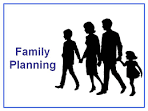Dr Adeduntan, remarking that nations of the world are now judged by their health indices rather than their GPDs, said the new family planning blue print will also ensure agencies knows where best to support family planning services in the state.
According to him, “our government is making sure that infant mortality and maternal mortality are brought very low. By this, we want to make sure at least six out of every 10 women do not deliver unnecessarily.
“If women do not space their children, the tendency for them to have problem at childbirth is higher. There is also the tendency for them to give birth to premature babies.”
Dr Adeduntan, noting that contraceptive rates was still low in some local government areas of the state, declared that different interventions like the Save One Million Lives (SOML) will also be support ensuring gaps in contraception in the state are met.
Acting Executive Secretary, Oyo State Primary Health Care Development Agency, Dr Lanre Abass at the launch listed challenges to increased CPR to include dearth of health workers, logistics for supervision and low provision of contraceptive consumables, adding that already an integrated facility supervision is now in place to improve family planning services and consumables for family planning services.
Earlier, Mrs Stella Akinso, Oyo State team leader, Nigerian Urban Reproductive Health Initiative (NURHI), stated that family planning was central to the nation’s development.
Akinso, who assured that NURHI will serve as a catalyst to achieving a 60 per cent CPR in Oyo State, urged increased involvement of all stakeholders to create demand for family planning services in the state.
According to her, “we need to increase access to family planning services. CPR is higher in urban area than rural areas. While it is less than one per cent in Itesiwaju Local government, it ranges between 25 and 30 per cent in Ibadan municipality.”
Akinso urged that no woman should be allowed to die as a result of pregnancy or pregnancy related complications, saying the newly launched family planning blue print was an opportunity to improve the state’s CPR.
Mr Yemi Osanyin, NURHI’s consultant, said the blueprint’s activities are structured around six basic areas of the health system for family planning. This includes demand generation and behaviour change communication, service delivery, supplies and commodities, policy and environment, financing, supervision, monitoring and coordination.
Source: MWN

 Going by Oyo State’s new family planning blue print, no less than N2billion would be required ever year to ensure the Oyo state’s contraceptive prevalence rate (CPR) increases from 37.4 per cent to 60 per cent.
Going by Oyo State’s new family planning blue print, no less than N2billion would be required ever year to ensure the Oyo state’s contraceptive prevalence rate (CPR) increases from 37.4 per cent to 60 per cent.




